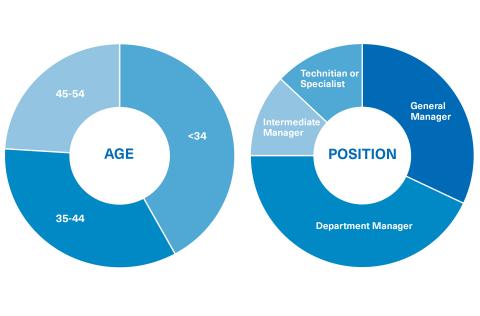
Master in International Business Management
- ONLINE
- 60 ECTS
- 7500€
- OPEN CALL
- 12 MONTHS
- ENGLISH
The Master's Degree in International Business Management, with a lifelong learning master's diploma, provides managers with the knowledge and skills necessary for effective international business negotiation. Our students will also plan and develop global growth strategies in order to achieve objectives and get ahead of market changes.
Our Master in International Business Management is also available in Spanish:
FIND OUT MORE ABOUT MÁSTER EN INTERNATIONAL BUSINESS MANAGEMENT

Master in International Business Management

Universitat de Barcelona
Get a double degree from our academic partner, the reference university in Catalonia and Spain with more than 560 years of history behind it.

QS Stars Rating System
We are the first 100% online Business School in the world to receive the QS Stars rating, obtaining the highest distinction, five QS Stars, in the Online Learning category.

Eduniversal Ranking
Our Master in International Business Management is the 7th Best Masters taught in Spanish in the Management category.
Master's in International Business Management Syllabus
Our program is structured in two different blocks and ends with the development of a Final Project. Moreover, during the development of the program you will have the chance to take one voluntary bootcamp and different additional activities.
Block 1. International business management
Block 2. International trade management
Final Project
Bootcamp and additional activities
1. International business management
This subject aims to develop a systematic approach to analysing current events in the international business environment. Topics covered include international integration, political risk, political regulations and environmental factors that influence corporate activities. The subject focuses on the analytical approach of the global business environment. Students learn actively through case studies, problem solving and the application of concepts. The course provides students with the opportunity to develop comparative and country analysis skills, to understand the most important macroeconomic indicators, to evaluate the main management risks and to identify business opportunities.
Lecturer: Albert Pallarès Solé, Cofounder of la Miük. The Skincare Boutique.
SEE LINKEDIN
This module examines the factors that enable companies to obtain and maintain competitive advantage in the international environment by identifying opportunities, creating capacities and developing new technologies and organisation methods. Strategic analysis is an important part of the class. We shall explore and apply various analytical techniques to effectively position the company or business unit in a competitive environment. The course will also cover various combinations of organisational structures and the people needed to run a particular strategy.
Lecturer: Marc Sansó Mata, Founder of ELSEBITS, strategy consultant, cluster practitioner.
SEE LINKEDIN
The internationalisation of businesses involves the participation of customers, producers, suppliers and other groups of interest in the global marketing process. This subject aims to give students an analytical, conceptual framework for making decisions, and drawing up and implementing marketing programmes worldwide. Topics such as the potential to internationalise, the selection of foreign markets, the development of global marketing programmes, and the implementation and monitoring of the global marketing programme will be covered.
Professor: Paloma Fuentes Santos, Global Digital Manager for Puig Brands at Starcom.
VIEW LINKEDIN
The international financial management module aims to provide a basic understanding of international finances and financial management options for companies in global markets. It explores the responsibilities of the finance directors of multinationals or companies with multinational subsidiaries, suppliers or international product markets. Topics covered include exchange rate risks and hedging with derivatives such as futures contracts, forward contracts and options. Payment mechanisms, international financing and business strategies are discussed and applied in order to maximise value for shareholders.
Lecturer: Dorina Nicoara-Popescu, University lecturer at several institutions.
SEE LINKEDIN
The module is designed to develop global business leaders. It covers the main management issues for companies doing business internationally. Topics include the cultural dimension of international management, diversity management, communication and leadership in a global context, and cultural impact and ethical dilemmas in global management. This module focuses on the application of skills, as well as case studies and methods of teaching and learning.
Lecturer: Palmira López Fresno, Chief Technical Advisor en ONUDI.
SEE LINKEDIN
2. International trade management
This course provides an overview of the management of e-businesses in a globalised world economy. Topics covered include technologies that support e-commerce, different models of e-commerce and their applications, safety issues, e-payment systems, legal and ethical issues, global matters on digital management, topics on design and implementation, and strategies used by e-businesses.
Lecturer: Roy Mouawad, Senior consultant at PwC and Quality director, Academic dean, Campus director, Professor at Geneva Business School.
SEE LINKEDIN
In this module we aim to provide students with the tools required to fully understand the entrepreneurial process in globalised markets. This course focuses on recognising and looking for global business opportunities, evaluating the feasibility of new companies and learning how to manage business growth. The main objectives include teaching students the skills needed to develop an original idea for a new business or create a new product or service for an existing business.
Lecturer: Albert Rof Bertrans, Fundador y General Manager en MANAGEMENT.cat
SEE LINKEDIN
Trade management is a key international activity, especially for small and medium- sized enterprises (SMEs). This module covers the theory and practice of import and export management. The main topics are business planning, intermediary management (including legal aspects), and financial risk management. Therefore, the module focuses on the strategic and operational challenges associated with the processes of importation and exportation.
Lecturer: Jan Jonckheere, Manager of Internacionalitza't export and internationalization consultancy.
SEE LINKEDIN
Students on this module develop the ability to conceptualise, design and implement supply chains aligned with product characteristics, the market and customers. Currently, international commercial competition is between supply networks instead of individual corporations. Students evaluate how information technologies, dynamic markets and globalisation are affecting strategies and practices in the supply chain, including logistics, digital coordination of decisions and resources, risk management and inventories, procurement and recruiting suppliers, product and process design, and income management.
Lecturer: Paolo Marone, Country Manager en Spindox España y Director del Máster en Supply Chain en EAE Business School.
SEE LINKEDIN
The purpose of this course is to help understand the theory of negotiations, as practised in a variety of strategic and international scenarios. It aims to help students feel more comfortable and confident with the negotiation process. The course is designed to be relevant to the broad spectrum of negotiation problems faced by managers using specific examples of international strategy, such as mergers, acquisitions and joint ventures. The course will give participants the opportunity to develop skills through experience and to understand negotiations in conceptual and analytical frameworks which are useful for international trade management.
Lecturer: Vitalie Ciobanu, EMEA Power BI Support Engineer in Microsoft.
SEE LINKEDIN
Final Masters' Thesis and Additional Activities
This programme is designed to complement the content of the thematic blocks with the necessary training to achieve their internalisation. The training is conceived from a threefold perspective: technical assistance, personal support and individual and group challenges that are necessary to achieve the objectives set.
Pre-Master Bootcamps
Once enrolled, the student will have the opportunity to take two pre-master bootcamps. These bootcamps will be progressively opened, and the student can take them at any time. A teacher will address students' concerns and doubts until the effective start of the program. Upon completion and passing of the course, the student will receive a certificate. The bootcamps are as follows:
- Building Your Professional Brand for Employability and Career Success
- Finance Fundamentals
- Organizational Well-Being
Introductory workshop| Campus Training
Before the beginning of the academic year, students will have the chance to attend to an introductory workshop about our virtual campus, Blackboard. During different training sessions students will learn how to properly use the campus, as well as they will deepen in the different necessary tools used during the Master.
Professional Development Programme (PDP)
Two weeks before the beginning of the academic year, students will have the chance to attend to a professional development program where they will work, hand-in-hand with a teacher, the development of different skills such as time management, productivity, stress management and emotional intelligence. If the student ends the PDP, developing all the activities, he will obtain a completion certification.
The international business simulation is the final module in the programme. It offers the culminating experience of the Master – designed to provide students with opportunities to integrate knowledge from all the previous modules, and to find out more about the meaning of professionalism and professional practice in international management.
Computer simulations are useful tools for learning and applying concepts. This module will include a computer simulation for entering international markets and expansion strategies. The course is designed to enable students to experience this, playing the role of a director of a major electronics company.
Lecturer: Dorina Nicoara-Popescu, University lecturer at several institutions.
SEE LINKEDIN
The lifelong learning master's degree in International Business Management is complemented with lectures, bootcamps and seminars which will be held in each of the blocks. These additional activities are performed by renowned professionals in the project management field who, through videoconferencing, will introduce students to their experiences and case studies.
Bootcamp | Doing Business in China
In an increasingly globalized business world, China's role has not yet reached its peak, pushing executives in a multitude of countries and functional roles to prepare for professional exchanges with potential customers, suppliers, etc. from the Asian giant.
This bootcamp aims to prepare participants for these first contacts, which are generally characterized by a substantial culture shock.
And as this first contact will probably be in the context of purchasing or sales operations, these two activities will be the main focus of the bootcamp.
Lecturer: Tom Van der Heyden, Co-founder and CEO at S3 Group, Strategic Sourcing Solutions.
SEE LINKEDIN
Bootcamp | Project management - SCRUM
The Project Management SCRUM course covers Agile principles and the SCRUM framework, including roles, artefacts, and events. It teaches planning and execution techniques, such as creating user stories, backlog prioritization, sprint planning, and task tracking. The course also explores best practices for scaling SCRUM and continuous improvement. Students gain hands-on experience with tools like Jira and Trello. Real-world applications and case studies are discussed to illustrate successful SCRUM implementations. The course combines theory, practical exercises, and real-world applications to effectively manage and lead SCRUM projects.
Lecturer: Manel Guerrís Larrury, founder in NEO Consulting BCN.
SEE LINKEDIN
Company visits
During the program, students will have the opportunity to assist in streaming to different web conferences with experts in different areas, related with the program. These professionals will share their knowledge and experience and will provide students with the best practices in the field.
Webinars
Most of the training is done asynchronously; it means that the exchange of knowledge is done through a software platform that allows sharing written texts without having people to be connected at the same time.
Additionally, in each of the subjects’ synchronous sessions or 'webinars' are organized, in sessions in which all participants are connected at the same time through a program allowing the exchange of knowledge in 'real time '.
The LLMD in International Business Management students have the chance to enroll in the training course for the following certifications:
• Scrum Master & Product Owner Certification
• Scrum Master@Scale Certification
• Product Owner@Scale Certification
• Value Stream Management Certification
*The certifications and tuition fees are not included in the LLMD price and will be conducted in Spanish.
Methodology

OBS has an online methodology where the core is the student. Always backed by active and internationally renowned lecturers, who share their knowledge to enhance the professional development of students through a flexible, collaborative method with personalised monitoring. The aim is to create a unique educational experience that allows the assimilation of knowledge in a practical way.
Student ON's fundamental pillar is the student and, for this reason, throughout the course students have their Programme Manager, an academic figure who accompanies them in a personalised way.
Diploma
After successfully finishing the Master's degree, and having completed the relevant procedures, you will receive the Master's degree from OBS Business School. In addition, and provided that you meet the established academic and administrative requirements, you will obtain a Lifelong learning Master's degree from the Universitat de Barcelona (UB).
In order to obtain it, you must have a university degree. In the exceptional case of not having this degree and having passed the Master's evaluations, you will obtain a Higher University Diploma from the Universitat de Barcelona (UB).
At OBS Business School we are committed to having our own degree, which allows us to quickly update and adapt the programmes in each edition to be at the forefront of the educational level demanded by companies today. Our programmes are designed for professionals who want to strenghten their management skills and learn through an international experience.

Admission Process
The fundamental aim of our admissions process is to ensure the suitability of candidates. All participants should get the most out of this learning experience, through a context in which it is possible to develop long-term relationships with classmates, faculty and alumni.
After completing the application form for one of our programmes, you will receive an e-mail with information about the School and a member of the Admissions Department will contact you to start the admission process.
Once you have successfully passed the personal interview, you must submit all the required documentation to continue the admission process and certify that you meet the requirements of the student profile. After the Admissions Committee, if it is positive, you will be able to register and enrol in the programme you have applied for.

Student Profile
The students of our Master's Degree in International Business Management come from different backgrounds and industries. However, they all have a common goal: to enhance their management skills in order to boost their professional careers.

Master's in International Business Management Career Oportunities
After completing the Master's Degree in International Business Management you can develop your professional career as:
- 1. International Sales Director
- 2. Export and Import Consultant
- 3. International Business Director
- 4. Marketing Director
- 5. Internationalisation consultant
- 6. International Team Manager
- 7. Head of Department in international companies
- 8. Export Manager


